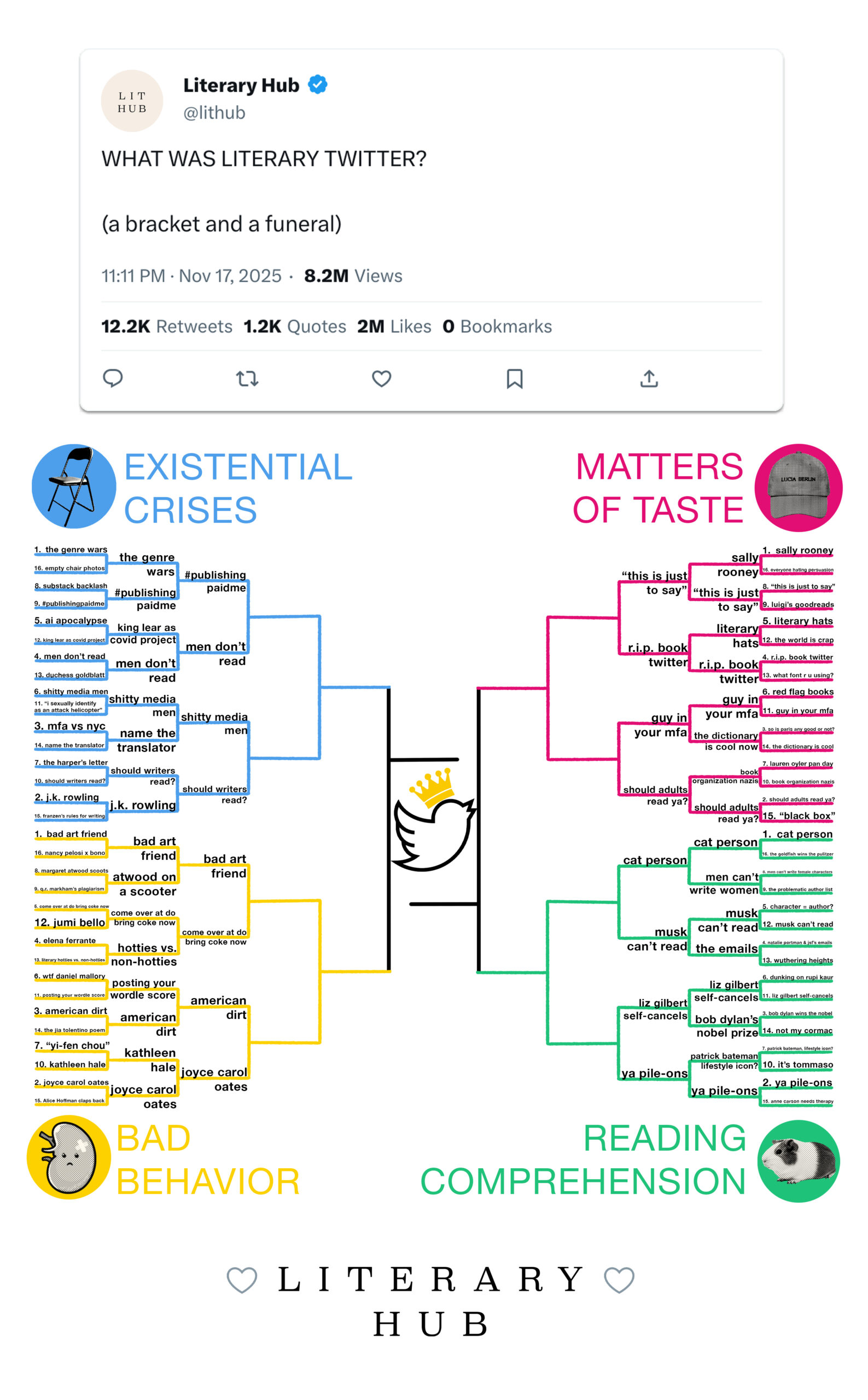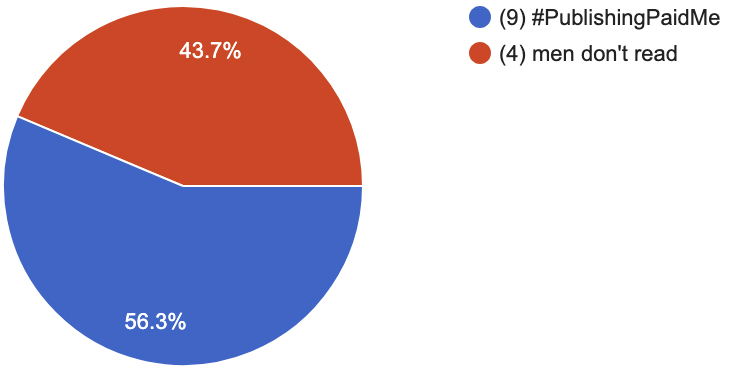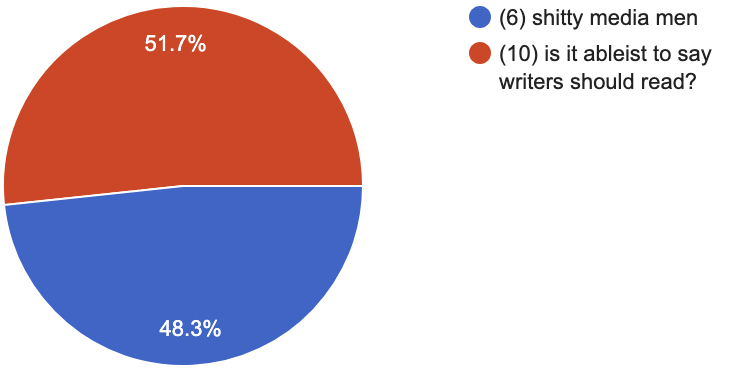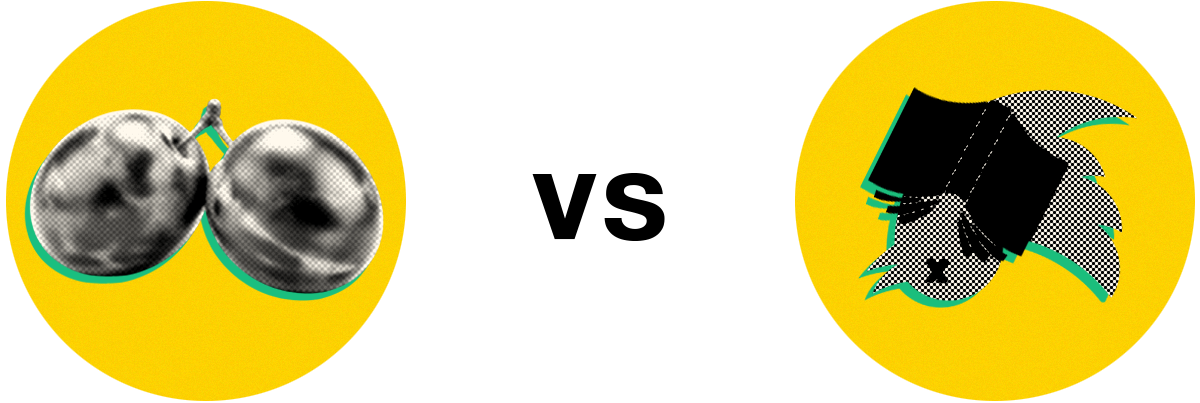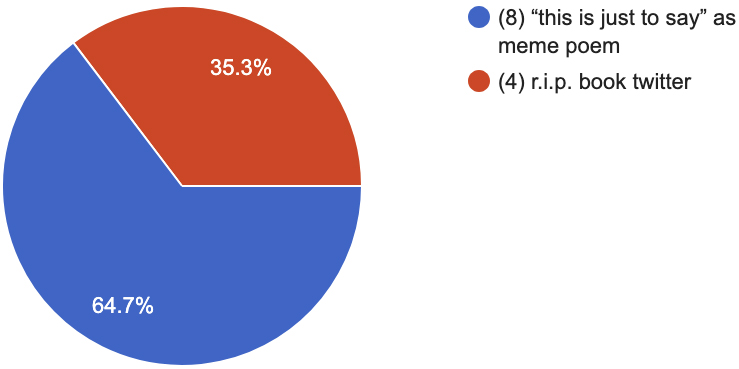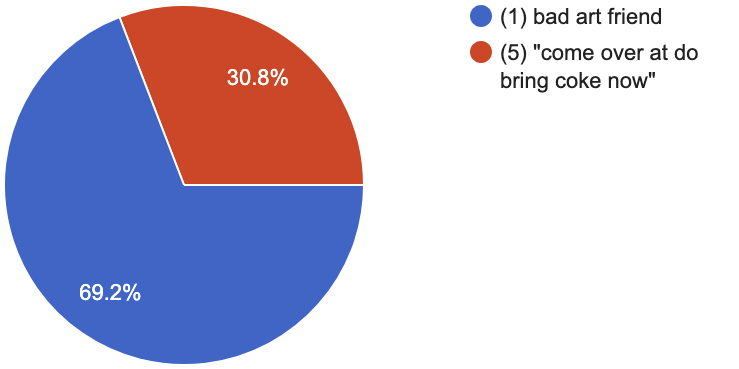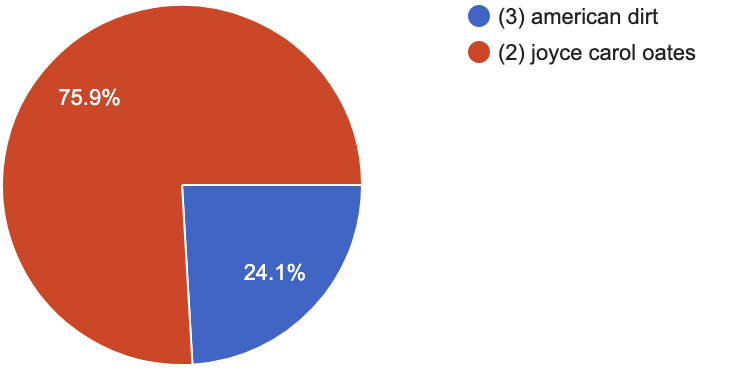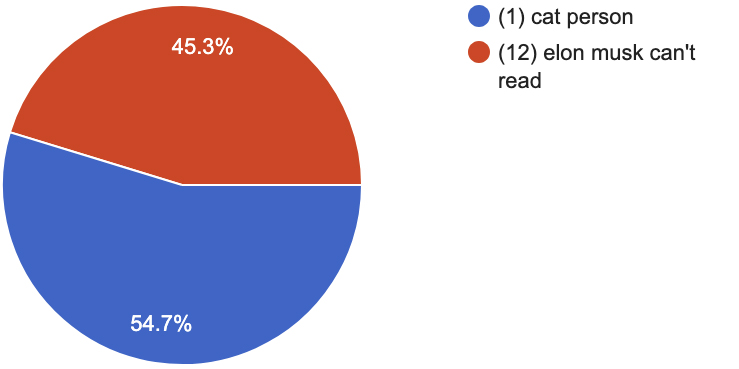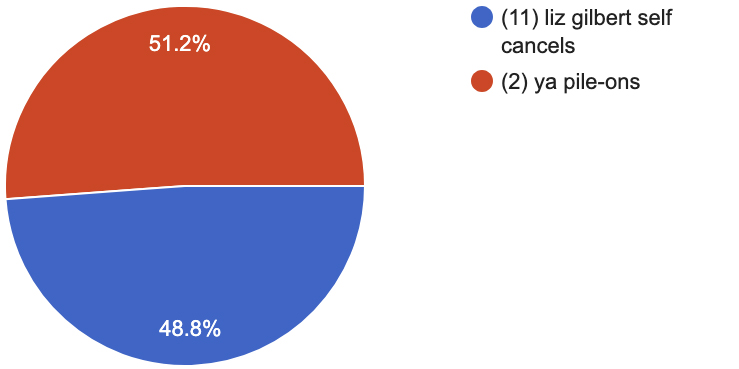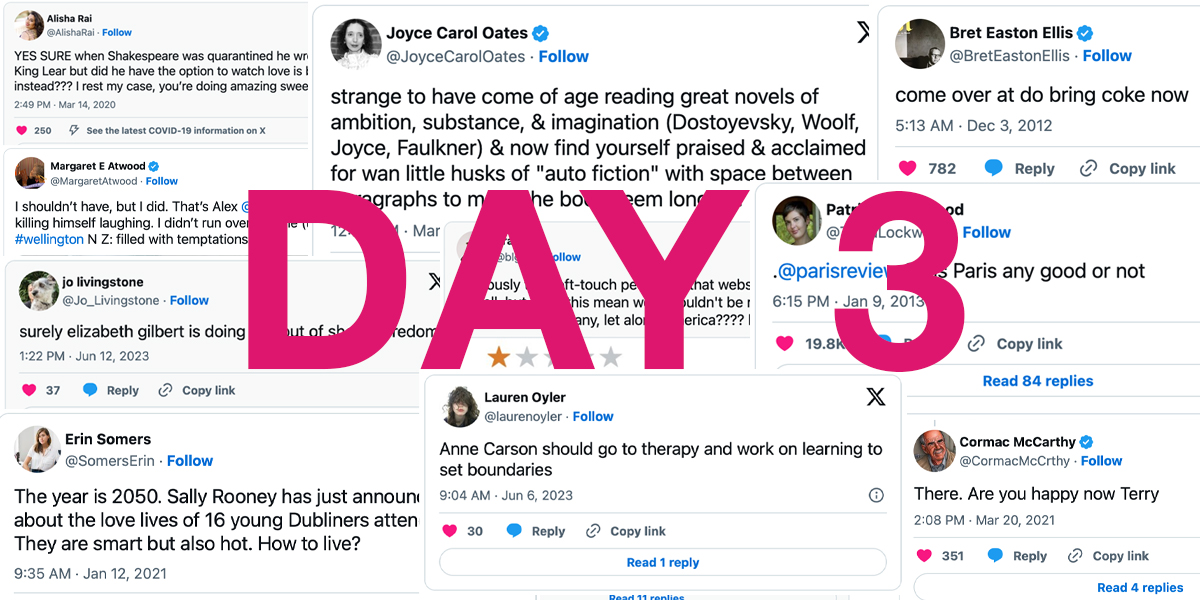
What Was Literary Twitter? The Bracket *Day 3*
or: the everything-to-us app
Welcome to the third day of voting! We’re down to just 16, and it’s getting harder for me to discern how this thing will shake out, to be honest. Unsurprisingly, a few top seeds remain—bad art friend and cat person—and seem destined to go far. But there were some pretty big upsets yesterday, too.
The eternal genre wars debate lost to the #PublishingPaidMe organizing campaign, which seems to follow the pattern we noticed yesterday of specific, Twitter-native events beating out more general conversations.
Similarly, discourse lightening rod and Millennial whisperer Sally Rooney lost to the William Carlos Williams poem-turned-meme. Rooney wasn’t alone, though—it was a bad showing for individual writers yesterday. Bob Dylan can’t survive Liz Gilbert’s self-cancellation, but he has his Nobel Prize to keep him warm. J.K. Rowling lost too and won’t be involved going forward—if only real life operated like the bracket.
The Portman-Safran Foer emails lost to Elon Musk’s lack of reading comprehension, yet another thing that man has stolen from me. This race was tied at exactly 50-50 for a good chunk of yesterday—every single vote counts, people.
As always, Joyce Carol Oates continues to put up big numbers and I think she could really go far in the bracket. There’s a much tougher road ahead for the queen of microblogging though. If she can beat the American Dirt controversy today (and yes, of course, she did tweet about it), she’s going to have a real challenge against either bad art friend or “come over at do bring coke now,” two very strong competitors.
She’s not alone though. Cat person vs. Elon Musk can’t read is going to be a tight race and bad art friend, a Lit Twitter drama that broke containment, is up against “come over at do bring coke now,” a bizarre, only-on-Twitter moment. I think there are going to be some very close races today!
We pass it to you now, readers! The polls are open!
Behold, the updated Bracket:
[Click to enlarge]
*
Rules
Now that Literary Twitter is dead, we’re asking, “What was it?” In this bracket, we’re seeking the Most Literary Twitter moment, discourse, or personage. What has been stuck in your mind, who sent you running to your group chat, what kept you scrolling for longer than you should have? What are you still bringing up in conversation today and having to explain to people with normal brains? In short, what most exemplified whatever the hell Literary Twitter was?
We’ve sorted all of the contenders (that we can remember) into four categories: Existential Crises, Matters of Taste, Bad Behavior, and Reading Comprehension. Each quadrant’s winner will face off on Friday, before the final head-to-head on Monday, November 24th to crown our winner.
*
Voting Schedule
Round of 64 Character Limit: Voting open now until tonight at 7:00 PM EST (Check out the results from the first round here)
Round of “dang, only 32 likes?”: Voting open Tuesday, November 18th from 10:00 AM – 7:00 PM EST (Round two results are here)
You are here –> Round of “sweet, 16 new followers”: Voting open Wednesday, November 19th from 10:00 AM – 7:00 PM EST
The Retweeted 8: Voting open Thursday, November 20th from 10:00 AM – 7:00 PM EST
The Quarter Finals: Voting open Friday, November 21st from 10:00 AM, until Sunday November 23rd at 7:00 PM EST
The Finals: Voting open Monday, November 24th from 10:00 AM – 7:00 PM EST
And the winner will be announced on Tuesday, November 25th!
*
How To Vote
We’ve got handy voting forms embedded below. Like looking back at the old Twitter interface, they’re a little ugly, but they get the job done. Simply select which of the two discourses you think should advance, and we’ll tabulate the votes at the end of each day.
*
Scroll on….
#PublishingPaidMe (9) vs. men don’t read (4)

#PublishingPaidMe (9)
Trending Because: At its best, Twitter was amazing as an organizing tool: you could yell at powerful people who were usually holed away in their ivory towers and you could share information they were trying to hide from the rest of us. Black writer L.L. McKinney started the hashtag #PublishingPaidMe to draw attention to the disparity between what Black and white authors were getting paid for deals. And it took off: Big name authors joined in to share what they made, and it got the attention of publications like The Times, NPR, and Vulture too. As much as people poo-pooed Twitter organizing as slacktivism, this sort of crowd-sourced transparency had its uses.
Retweeted by: The angry and underpaid
VS.
men don’t read (4)
Trending Because: American men have been around for almost 250 years now, but no one has yet managed to figure them out. A recent flashpoint in the Men Debates is whether they like books or not. The data points to the fact that men aren’t reading that many novels—or books in general—but the vibes are pointing in a thousand different directions.
There are some excellent long pieces on the phenomenon, but on Twitter the debate has consisted mostly in how reading Blood Meridian is like grunting, under thirty-five year olds reading is the ick, or “books is a woman things.”
Retweeted by: Worried book club members.
*
shitty media men (6) vs. is it ableist to say writers should read? (10)

shitty media men (6)
Trending Because: “Shitty Media Men” began in October of 2017 as an anonymous Google spreadsheet. Maybe you remember it coming through your inbox. (It was forwarded to multiple women in the Lit Hub office.) Even if you were never actually sent it, you probably remember the social media (and regular media) shit (ha ha) storm it kicked off.
The spreadsheet was just what it said on the tin: a list of shitty men in media: editors, writers, publishers, etc. Anyone could contribute anonymously, and the shittiness ranged from rape to creepy behavior to flirting. It had been intended as a sort of digital whisper network—the rules listed at the top of the document were “Please never name an accuser, and please never share this document with a man.” There was also a disclaimer, which read “This document is only a collection of misconduct allegations and rumors. Take everything with a grain of salt. If you see something about a man you’re friends with, don’t freak out. Men accused of physical sexual violence by multiple women are highlighted in red.” The document was only live for about 12 hours; by the time it was taken down (because BuzzFeed was planning to write about it publicly) it featured over 70 names and had gone hugely viral, at least in media circles, which very much includes our own Literary Twitter.
Three months later, an editor named Moira Donegan published an essay in The Cut outing herself as the creator of the Shitty Media Men list—in large part because Katie Roiphe was planning to dox her in Harper’s magazine, which Donegan learned through a fact-checker.
“I was incredibly naïve when I made the spreadsheet,” she wrote. “I was naïve because I did not understand the forces that would make the document go viral. I was naïve because I thought that the document would not be made public, and when it became clear that it would be, I was naïve because I thought that the focus would be on the behavior described in the document, rather than on the document itself. It is hard to believe, in retrospect, that I really thought this. But I did.”
There was controversy over the list itself; there was controversy over its design, its purpose, its ownership, and of course there was controversy when it came out that Roiphe planned to name Donegan.
“People who opposed the decision by Harper’s speculated about what would happen to me as a result of being identified,” Donegan writes. “They feared that I would be threatened, stalked, raped, or killed. The outrage made it seem inevitable that my identity would be exposed even before the Roiphe piece ran. All of this was terrifying. I still don’t know what kind of future awaits me now that I’ve stopped hiding.”
As for Roiphe, in the eventual Harper’s piece, she wrote:
Before the piece was even finished, let alone published, people were calling me “pro-rape,” “human scum,” a “harridan,” a “monster out of Stephen King’s ‘IT,’?” a “ghoul,” a “bitch,” and a “garbage person”—all because of a rumor that I was planning to name the creator of the so-called Shitty Media Men list. The Twitter feminist Jessica Valenti called this prospect “profoundly shitty” and “incredibly dangerous” without having read a single word of my piece. Other tweets were more direct: “man if katie roiphe actually publishes that article she can consider her career over.” “Katie Roiphe can suck my dick.”
Twitter. It was great for everyone!
Retweeted by: Everyone in your office
VS.
is it ableist to say writers should read? (10)
Trending Because: The trick to Twitter was to be just popular enough. There has always been a hard ceiling on the benefits of virality: you want to be popular, but never the main character.
One of the most searing examples of this dynamic was when Ana Mardoll got the main character treatment after posting a now deleted Tweet saying it’s ableist to expect writers to read. Weird stuff, by all accounts, and this was such an attention-grabbing take that it also led people to discover that Mardoll was a neoptism hire at the giant weapons company Lockeed Martin, in addition to being a writer. If you don’t remember the details (and want to), Brandon Yu helpfully rounded up the whole story here.
Writing, building bombs, and posting wild takes? That’s the American Dream right there.
Retweeted by: Drone pilots who love YA
*
“this is just to say” as meme poem (8) vs. r.i.p. book twitter (4)
“this is just to say” as meme poem (8)
Trending Because:
This is just to say
you have seen
the William Carlos Williams meme poems
that were started
as early as the ‘60s
and which
you have probably
memed
for yourself
Forgive me
they’re all so delicious
so sweet
and so everywhere
Retweeted By: The aspiring poet in all of us and wicked, unapologetic plum thieves
VS.
r.i.p. book twitter (4)
Trending Because: What was more Literary Twitter than the handwringing about the fate of Literary Twitter? Musk took it over in October 2022, at which point we were already calling it the Hellsite, spawning a lot of people leaving, or at least promising they were going to leave. Lit Hub did not pull the plug until May 1, 2025, at which time our Editor in Chief Jonny Diamond wrote:
We no longer want to provide free content and engagement to a deranged billionaire and his dysfunctional little clubhouse. I understand the argument that we shouldn’t cede our space in the public square to the bad people, to which I respond: How is a privately owned, algorithmically driven digital service, that suppresses speech it doesn’t like and amplifies speech (often hateful) that it does, anything like a true public square? To take the analogy further: If all your friends have left the town square, and it’s full of hateful morons with the loudest bullhorns, who just want to sell you fallout shelter supplies and dick pills, wouldn’t you leave?
In the meantime, you can find us on Bluesky.
Retweeted by: We don’t know, we aren’t there anymore
*
guy in your mfa (11) vs. should adults read ya? (2)
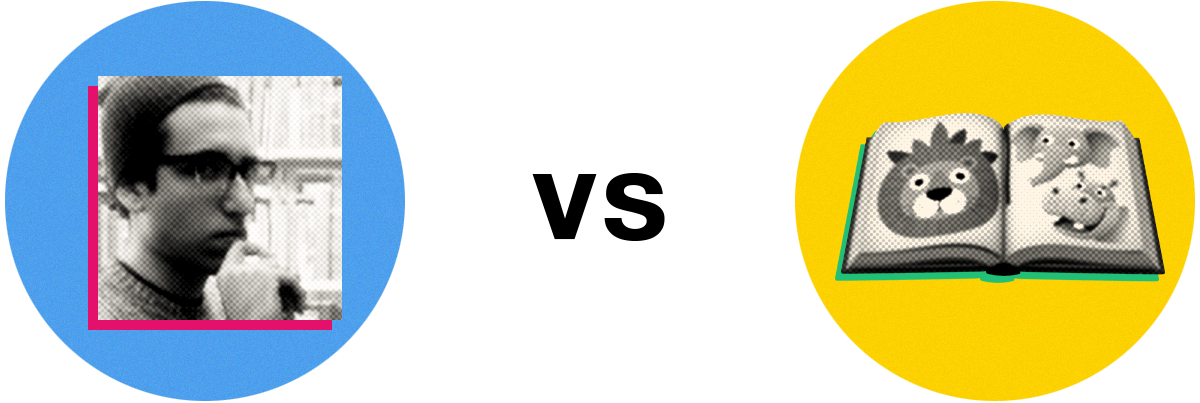
guy in your mfa (11)
Trending Because: Maybe the most memorable Literary Twitter bit account, just edging out @Kim Kierkegaardashian. @GuyInYourMFA embodies the worst version of the stereotypical dude writer who has both too much and too little to say. The tweets nailed the voice of this workshop menace, who was full of references, ideas for novels, takes on feminism, new Moleskines, spelling opinions, musings on writing women, and so much more. And not to brag, but we got to interview “him.”
Retweeted By: Anyone who has taken a workshop with one of these guys
VS.
should adults read ya? (2)
Trending Because: The heat coming off posts about YA could warm a small Nordic country. Most of this passionate (deregatory) posting is about the basic question of whether it’s okay for adults to read young adult books. Is YA a comfort blanket for the morally superior, just simplistic, unchallenging fiction? Has the tastes of YA readers changed publishing? Should the “old hags” complaining about it just shut up?
People simply love to shout about this one. One of the biggest Twitter reactions to a piece of writing I’ve ever seen happened in the wake of Ruth Graham’s “Against YA” essay. The vitriol was so intense that Teddy Wayne included it in an essay on how bad internet outrage has gotten.
Retweeted By: The forever young and the forever mad
*

bad art friend (1) vs. “come over at do bring coke now” (5)

bad art friend (1)
Trending Because: Bad Art Friend was the biggest literary story—Twitter or otherwise—of 2021. In case you’ve blocked it out, it all started on October 5, when Robert Kolker published a feature article in The New York Times entitled “Who Is the Bad Art Friend?”. The saga within is almost too convoluted to summarize, but basically, back in 2015, a writer named Dawn Dorland donated one of her kidneys to a stranger and posted about it on Facebook—only to find, sometime later, that another writer, Sonya Larson, an acquaintance via the Boston nonprofit writing org GrubStreet, had written a short story about kidney donation that seemed to borrow heavily from her Facebook posts. Lawsuits, and some staffing changes at GrubStreet, not to mention everyone turning off their history, ensued.
Literally everyone seemed to have a take on this, even people not usually on Literary Twitter. Some read the article and concluded that Dorland was the Bad Art Friend. Others thought it was Larson all along. As our own Walker Caplan put it at the time: “The lesson of “Bad Art Friend” is Cover your tracks when writing fiction about real people; or it’s Never pitch articles about yourself; or it’s Don’t extensively insult your acquaintances in group chats lest they be subpoenaed; or it’s The conflation of friendship and professional connection that the writing world necessitates isn’t good for anyone.” (Lit Hub’s official take is that donating kidneys is good.) It spurred major, frenzied discussions about writing communities, race, class, cringiness, mean girls, the literary industry at large, and of course, the literary internet itself. That’s what staring into a mirror when you are, yourself, a mirror gets you.
(By the way, in 2023 a court ruled that the Bad Art Friend was in fact, both of them.)
Retweeted by: Writers suddenly living in fear of their group chats being subpoenaed; AWP-goers
VS.
“come over at do bring coke now” (5)
Trending Because: This is what Bret Easton Ellis tweeted at 2:13AM (his time) on December 3, 2012. This, apparently a misdirected text to his dealer, has been described as “the greatest tweet of all time.” Years later, he auctioned off the tweet as an NFT.
Retweeted by: People afraid to merge
*
american dirt (3) vs. joyce carol oates (2)
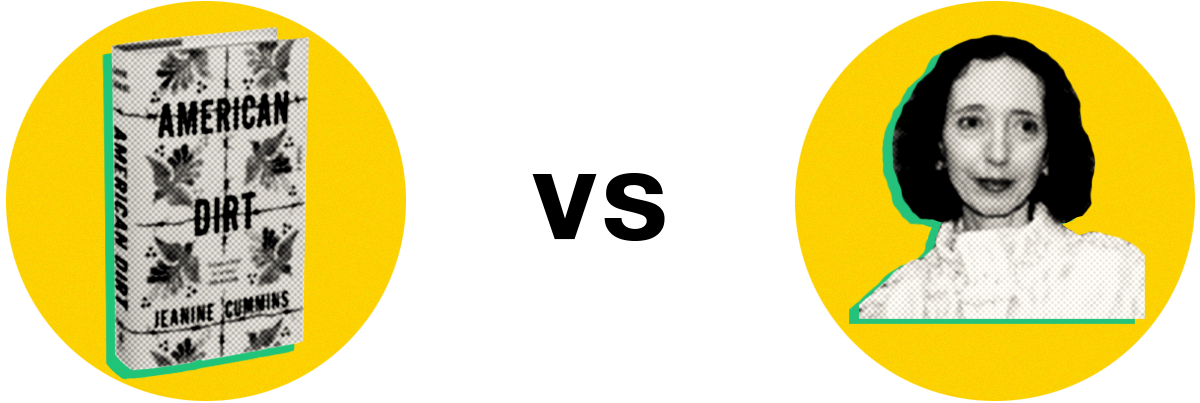
american dirt (3)
Trending Because: In January 2020, Flatiron published Jeanine Cummins’s American Dirt, a book about a Mexican bookseller who finds herself forced to flee (illegally) to America to escape the cartel, which was pitched as “a literary achievement filled with poignancy, drama, and humanity” and “one of the most important books for our times,” and came emblazoned with rapturous blurbs from Stephen King, Sandra Cisneros, Ann Patchett, and Julia Alvarez. It was the talk of the literary town! But, as Lit Hub’s Jonny Diamond wrote, “as Cummins’s novel made its way into the broader pre-pub world the criticism began, led by Myriam Gurba’s vigorous December 12, 2019 polemic at Tropics of Meta, in which she notes that “Dirt is a Frankenstein of a book, a clumsy and distorted spectacle and while some white critics have compared Cummins to Steinbeck, I think a more apt comparison is to Vanilla Ice.” Things picked up speed from there.”
The outrage was immense. People hated not just the book, which was widely perceived as badly written and exploitative, but also the way it was being rolled out—this was a book about immigration written by a white woman who got a seven-figure book deal and a book party decorated with barbed wire, and who was touted, in the letter that accompanied early copies of the book sent to media outlets, as the wife of a “previously undocumented” immigrant (Cummins’s husband is Irish, which is…not the same). It was, to many on Literary Twitter and elsewhere, emblematic of the publishing industry’s history and present of tokenization, cultural stereotyping, and whitewashing.
By the end of January, the remainder of Cummins’ tour was cancelled after reported threats of violence against both Cummins and the host booksellers; reportedly some reviewers also received threats.
A protest group called #DignidadLiteraria, spearheaded by Gurba and writer Roberto Lovato in response to the controversy, organized an open letter at this website when news hit that Oprah would select American Dirt for her Book Club. “This is not a letter calling for silencing, nor censoring,” it reads in part. “But in a time of widespread misinformation, fearmongering, and white-supremacist propaganda related to immigration and to our border, in a time when adults and children are dying in US immigration cages, we believe that a novel blundering so badly in its depiction of marginalized, oppressed people should not be lifted up.” (Macmillan, Flatiron’s parent company, agreed to meet with the group on February 3 and “committed to substantially increasing Latinx representation, from authors to staff.”)
Obviously, the book was a huge bestseller.
Retweeted by: People who would definitely not get a barbed wire manicure
VS.
joyce carol oates (2)
Trending Because: Joyce Carol Oates is the demigod of Literary Twitter. This is a woman so prolific she writes a book a year and still has time to tweet about everything under the sun, the takes ranging from terrible to excellent to head-scratching to hilarious to the picture of her foot.
As Eric Thurm put it on this very website: “Like your mythical uncle, Joyce Carol Oates is, at heart, a troll. Prolific across all mediums, it is not difficult to imagine Oates delighting in the act of tweeting, of tossing thoughts into the world, both for the enjoyment of the craft and to see what happens, like tiny crystalline bombs. Joyce Carol Oates is very bad at Twitter, which is also to say she’s very good at Twitter.”
Also: the woman is 87! She just tweeted 3 minutes ago. All hail.
Retweeted by: Wan little husks
*
cat person (1) vs. elon musk can’t read (12)

cat person (1)
Trending Because: In 2017, The New Yorker published a short story by a then-unknown writer, and within days it had gone viral. It would become the year’s second-most-read piece on the website, despite it being published in (checks watch) December. And again, a short story. Everyone was talking about it, even people who didn’t usually read fiction. (This was during the #MeToo movement.) Some of those people actually didn’t know they were reading fiction. Many women were in awe of how relatable it was. Many men felt they had to explain that it wasn’t that relatable at all. Some people bemoaned the fact that “relatability” was apparently important to readers; other people bemoaned the fact that some people were complaining about literature going viral. Fine.
But THEN, years later, a woman named Alexis Nowicki wrote an article alleging that “Cat Person” was based on her life. The debate about the story was instantly reignited, this time with a new bent: is it okay to steal the lives of others to write viral short stories and get seven figure book deals? Turns out there was actually no answer. Isn’t that always the way?
Retweeted by: People with ex-boyfriends
VS.
elon musk can’t read (12)
Trending Because: There’s no lack of evidence that the richest man in the world isn’t a particularly deep thinker. Lit Twitter’s contribution was calling out how often Musk keeps clearly misunderstanding books, everything from Orwell, to Huxley, to Ian M. Banks, to Asimov. His lack of media literacy wouldn’t be an issue if he wasn’t able to act on these terrible misinterpretations, and if he wasn’t so deeply and obviously desperate to be liked. A trillion dollars can’t buy you a clue, it seems.
Retweeted By: A lonely man shouting on the playground that he bought, and Joyce Carol Oates dunking on him over and over and over
*
liz gilbert self cancels (11) vs. ya pile-ons (2)
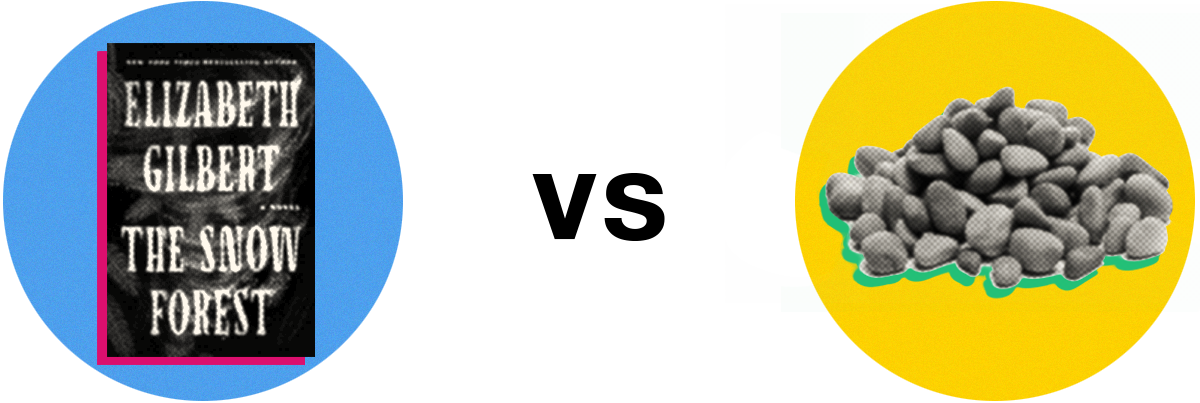
liz gilbert self cancels (11)
Trending Because: In June of 2023, by any measure close to the end, Elizabeth Gilbert announced a new novel, entitled The Snow Forest, in which a family flees Soviet forces to a Siberian forest where they “protect nature against industrialization.” After “overwhelming” outrage stemming from Russia’s assault on Ukraine, she backpedaled, publishing a video in which she told readers, “I have received an enormous massive outpouring of reactions and responses from my Ukrainian readers expressing anger, sorrow, disappointment, and pain about the decision that I would choose to release a book right now … set in Russia. I am making a course correction.” (The book, which had been slated for publication in February 2024, has not yet been released.)
But Literary Twitter was not appeased. Or at least, a different side became interested:
I applaud Elizabeth Gilbert’s choice to not publish a book about people resisting the Russian government, in order to avoid doing harm to people resisting the Russian government
— Adam O’Fallon Price (@AdamOPrice) June 12, 2023
It could not be more counterproductive for American cultural authorities to proclaim that they believe that even Russians who resist authoritarianism are irreparably tainted by their Russianness
— Erik Baker (@erikmbaker) June 12, 2023
Obviously the soft-touch people on that website are unwell, but does this mean we…shouldn’t be reading books set in Germany, let alone America???? lol pic.twitter.com/yeBJFkKi5a
Article continues after advertisement— Brandon (@blgtylr) June 12, 2023
surely elizabeth gilbert is doing this out of sheer boredom
— jo livingstone (@Jo_Livingstone) June 12, 2023
Retweeted by: Elizabeth Gilbert fans, Elizabeth Gilbert haters, Elizabeth Gilbert
VS.
ya pile-ons, or ya twitter’s toxicity problem (2)
Trending Because: YA Twitter always seems to be embroiled in some sort of drama or pile-on that would be illegible even 15 years ago. Some of these takes would kill a small Victorian child.
It’s not always the YA fans who are acting out, the authors are behaving badly too. One of the most prominent cases was when bestseller Sarah Dessen zoomed in on a local news story where a student was quoted saying that Dessen’s books shouldn’t be included on a university “Common Read” list. Dessen crashed out spectacularly and pulled in her very famous author friends, starting “a minor Twitter riot” to gang up on the student. Even by YA Twitter standards, it got very ugly, very fast.
Retweeted By: The thin skinned









